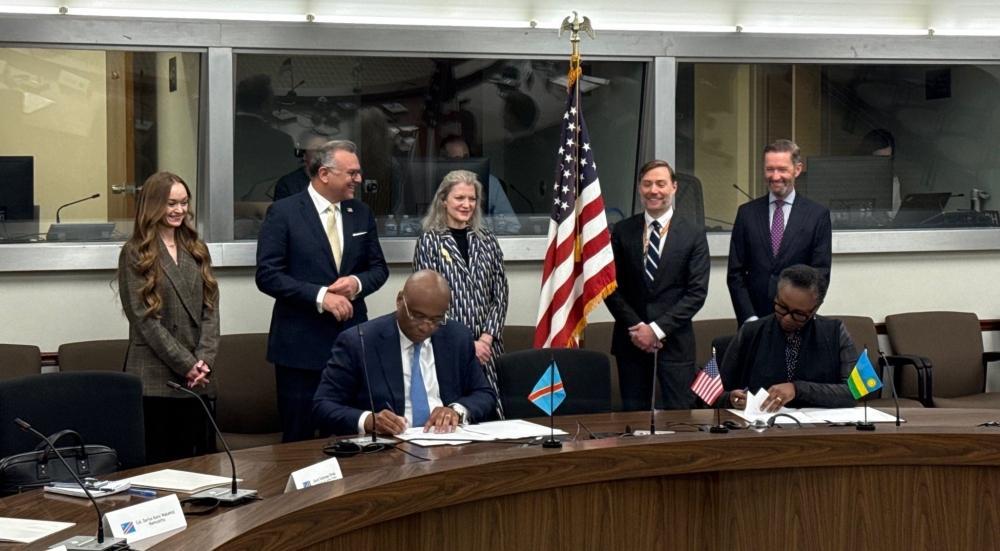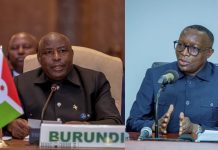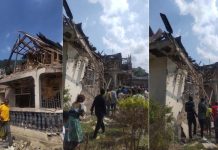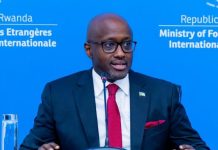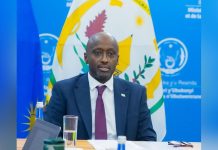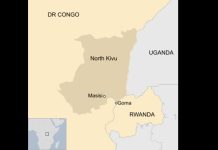Africa-Press – Rwanda. Officials from the governments of Rwanda and DR Congo on Friday, November 7, initialed the full text of a proposed Regional Economic Integration Framework (REIF), which both sides have described as a “significant step toward.”
One analyst has described the development as “a good reason to be optimistic” in advancing peace and future economic cooperation between the two countries, which signed a peace agreement about four months earlier, thanks to US mediation efforts.
The REIF forms part of the Washington Peace Agreement signed in June 27 and deals with the promotion of joint economic development as a foundation for lasting peace in the region.
The progress was announced in a joint communique following a meeting of the Joint Oversight Committee, which brought together representatives from Rwanda, DR Congo, the United States, Togo, Qatar, and the African Union Commission to review the peace deal’s implementation.
The milestone comes after an earlier attempt on October 3 was aborted when DR Congo’s delegation withdrew on the instruction of President Felix Tshisekedi, according to Rwanda’s Minister of Foreign Affairs and International Cooperation, Olivier Nduhungirehe.
The framework outlines key areas of cooperation, including mining, infrastructure, energy, industrial development, agribusiness, public health, and national park management, all aimed at fostering shared benefits and cross-border stability.
It also envisions “mutually beneficial partnerships, greater connectivity with regional and international development initiatives, and new investment opportunities” for both nations.
Eric Ndushabandi, a lecturer at the University of Rwanda and political analyst, said the latest development signals renewed commitment to advancing peace through shared economic interests.
“What we are seeing is a strong commitment by both sides to advance peace through shared economic goals,” Ndushabandi told The New Times. “When countries have common economic interests, they are more likely to choose cooperation over confrontation.”
He noted that durable peace in the Great Lakes region depends on dismantling armed groups in eastern DR Congo, particularly the FDLR, which is a Rwandan genocidal militia backed by the Congolese government.
“The process must start with eliminating the FDLR and other negative forces that threaten security,” he said. “Joint military operations between Rwanda and DR Congo could help address these threats and build mutual confidence, eventually allowing Rwanda to lift its defensive measures along the border.”
However, Ndushabandi cautioned that progress will hinge on DR Congo’s political will and institutional coordination.
“The Congolese leadership needs to ensure that all branches of government, the executive, parliament, judiciary, and defense share a unified vision,” he noted. “Recently, we have seen resistance in the Congolese parliament, where some lawmakers accused President Tshisekedi of selling out national resources. The government must build internal consensus to make this process credible.”
He added that REIF should complement rather than duplicate existing regional mechanisms such as the CEPGL, EAC, and COMESA.
“It’s important to assess whether the REIF will serve as a new framework or help revive existing regional cooperation structures,” Ndushabandi observed.
He further emphasized that success will also depend on progress of the Doha peace process between the Congolese government and the AFC/M23 movement, which controls swathes of territory in eastern DR Congo.
“The Doha and Washington processes are interconnected,” he said. “Since areas like North and South Kivu remain under M23 control, the success of the REIF depends on progress in Doha. If both processes stay coherent and coordinated, there’s genuine reason to remain optimistic.”
“The REIF is not just a document, it represents a commitment to a new paradigm of cooperation. If both sides stay the course, there is indeed good reason to be optimistic.” Ndushabandi added.
Alex Mvuka, a Congolese political analyst, said political will and ownership of the peace process will determine whether the economic and peace initiatives succeed or fail.
“The Congolese government and leaders must truly own the peace process and the solutions it proposes,” Mvuka said. “They have repeatedly stated that they cannot engage with the AFC/M23 movement, yet they simultaneously claim to be involved in peace efforts in Qatar,”
“Likewise, while saying they are committed to peace with Rwanda, they continue issuing hostile rhetoric. Nothing has changed internally since joining the Washington Peace Process, which raises questions about their seriousness toward the peace and economic deals.”
He added that weak institutional capacity remains a obstacle.
“What often undermines peace processes is poor institutional capability to implement outcomes,” Mvuka argued. “Delegates may be sent to Washington or Doha, but their participation feels like a foreign mission, there’s little domestic ownership or follow-up once they return. The question is, are they truly committed?”
Mvuka observed that current signs from Kinshasa suggest otherwise.
“In my view, no. The government is still preparing for war and campaigning against Rwanda. You cannot claim to be part of a peace process with one hand while sustaining hostility with the other.”
Still, he acknowledged that the economic deal could inject new hope if implemented sincerely.
“If the economic deal is signed and implemented in good faith, it could positively influence the peace process,” he said. “But that requires realism and pragmatism—shared interests in security, geopolitics, and economic integration. The potential benefits are immense if both parties commit.”
He added that while Rwanda appears ready to advance the agreement, success largely depends on DR Congo’s stance.
“I believe Rwanda would want this agreement to happen because it offers multiple gains, reduced hostilities, improved security, and deeper economic integration,” he said.
“But in DR Congo, it is harder for the government to rally behind one shared vision. In Rwanda, once the leadership commits to something, institutions and even citizens tend to move in the same direction.”
Fatuma Ndangiza, a member of the East African Legislative Assembly (EALA), said the deal’s main objective is to restore good relations through trade, cooperation, and regional integration, a mutually beneficial approach that supports both peace and prosperity.
“There is a strong correlation between trade, regional integration, and peace,” Ndangiza argued.
“When countries trade and cooperate, they build trust, people-to-people ties, and shared prosperity. Both Rwanda and DR Congo need economic growth, and by working together, they are stronger than if each acted alone.”
She noted that the framework could also reinforce broader East African Community (EAC) efforts.
“The success of this economic framework would not only strengthen bilateral relations but also catalyze ongoing regional integration initiatives like the EAC,” she said, adding that “its success should matter to all who care about peace in the region.”
Ndangiza stressed that peace and economic cooperation are inseparable.
“You cannot build peace in isolation,” she said. “Peace and economic cooperation are complementary. The economic deal may not be a precondition for peace, but it is one of its key pillars and should be in the interest of all partners, especially DR Congo.”
“If your house is on fire and your neighbor offers to help you rebuild, you should be the most eager to cooperate. DR Congo should take the lead in ensuring compliance with both the economic deal and the broader peace process.”
Friday’s joint communiqué acknowledged “lagging progress” in implementing the Washington Peace Agreement but reaffirmed the parties’ commitment to “redouble efforts” toward its execution.
The next steps include dismantling the FDLR, facilitating efforts that lead to the lifting of Rwanda’s defensive measures along its border with DR Congo.
For More News And Analysis About Rwanda Follow Africa-Press

